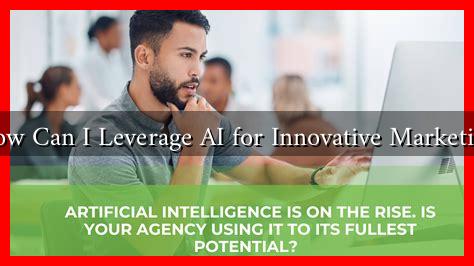-
Table of Contents
How Can I Leverage AI for Innovative Marketing?
In today’s fast-paced digital landscape, businesses are constantly seeking innovative ways to engage customers and enhance their marketing strategies. Artificial Intelligence (AI) has emerged as a game-changer, offering tools and insights that can transform traditional marketing approaches. This article explores how you can leverage AI for innovative marketing, providing actionable insights and real-world examples.
Understanding AI in Marketing
AI refers to the simulation of human intelligence in machines programmed to think and learn. In marketing, AI can analyze vast amounts of data, predict consumer behavior, and automate repetitive tasks. By harnessing AI, businesses can create personalized experiences, optimize campaigns, and improve customer engagement.
Key Areas Where AI Can Enhance Marketing
Here are several key areas where AI can significantly enhance your marketing efforts:
- Personalization: AI can analyze customer data to deliver personalized content and recommendations. For instance, Netflix uses AI algorithms to suggest shows based on viewing history, resulting in higher user engagement.
- Predictive Analytics: AI can forecast future consumer behavior by analyzing past data. Companies like Amazon utilize predictive analytics to recommend products, increasing sales and customer satisfaction.
- Chatbots and Customer Service: AI-powered chatbots can handle customer inquiries 24/7, providing instant responses and improving customer experience. For example, Sephora’s chatbot offers personalized beauty advice, enhancing customer interaction.
- Content Creation: AI tools can generate content, from social media posts to blog articles. Tools like Copy.ai and Jasper can help marketers create engaging content quickly and efficiently.
- Ad Targeting: AI can optimize ad campaigns by analyzing user behavior and preferences, ensuring that ads reach the right audience. Facebook and Google Ads use AI to enhance targeting and improve ROI.
Real-World Examples of AI in Marketing
Several companies have successfully integrated AI into their marketing strategies, yielding impressive results:
- Starbucks: The coffee giant uses AI to analyze customer data and preferences, allowing them to create personalized marketing campaigns. Their “My Starbucks Rewards” program leverages AI to offer tailored promotions, resulting in increased customer loyalty.
- H&M: The fashion retailer employs AI to analyze customer feedback and trends, enabling them to optimize inventory and marketing strategies. This data-driven approach has led to improved sales and customer satisfaction.
- Spotify: Spotify uses AI algorithms to curate personalized playlists for users, enhancing user experience and engagement. Their “Discover Weekly” feature has become a hallmark of their marketing strategy, driving user retention.
Implementing AI in Your Marketing Strategy
To effectively leverage AI in your marketing strategy, consider the following steps:
- Identify Your Goals: Determine what you want to achieve with AI—whether it’s improving customer engagement, increasing sales, or enhancing brand awareness.
- Choose the Right Tools: Research and select AI tools that align with your marketing goals. Platforms like HubSpot, Salesforce, and Marketo offer AI-driven marketing solutions.
- Invest in Data: Ensure you have access to quality data, as AI relies on data to generate insights. Implement data collection strategies to gather relevant customer information.
- Test and Optimize: Continuously monitor the performance of your AI-driven campaigns. Use A/B testing to refine your strategies and improve results.
Challenges and Considerations
While AI offers numerous benefits, there are challenges to consider:
- Data Privacy: With increasing concerns about data privacy, ensure compliance with regulations like GDPR when collecting and using customer data.
- Integration: Integrating AI tools with existing systems can be complex. Ensure your team is trained to use these tools effectively.
- Cost: Implementing AI solutions can be costly. Assess your budget and consider starting with smaller projects before scaling up.
Conclusion
Leveraging AI for innovative marketing can significantly enhance your business’s ability to connect with customers and drive sales. By personalizing experiences, utilizing predictive analytics, and automating tasks, you can create a more efficient and effective marketing strategy. As demonstrated by leading companies, the successful integration of AI can lead to increased customer satisfaction and loyalty. However, it is essential to navigate the challenges of data privacy, integration, and cost to fully realize the potential of AI in your marketing efforts. Embrace the future of marketing by harnessing the power of AI today.
For more insights on AI in marketing, consider exploring resources from Forbes.

